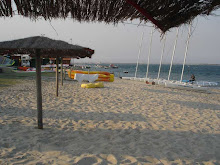
The children of Angola are paying a heavy price for under-funded humanitarian operations across the country, where high malnutrition rates and preventable diseases are taking their toll on the weakest, WFP has warned.
At least 45 percent of all children in Angola are severely malnourished, and in the central highlands up to 52 percent of the under five-year-olds are stunted, a condition which irreversibly affects their ability to live a fully productive life.
Losing another generation
“Many international donors think the crisis in Angola is over but a scenario is emerging that is every bit as destructive for children as the war itself,”
said Rick Corsino, WFP Country Director.
“Angola risks losing a further generation of children, this time to malnutrition-related diseases like tuberculosis and pellagra, because we do not have enough funding to reach all those who need food assistance.”
Chronically food insecure
According to a recent WFP study, 850,000 people are chronically food insecure in the central highlands alone, living on one meal or less per day.
Although fertile, the central highlands region has one of the highest concentrations of uncleared land mines in the country. As a result, people who have returned to their land, post-war, have been forced to limit agricultural activities, thus reducing their ability to grow enough food.
Education and basic nutrition
“If Angola is ever to get back on its feet, children must have access to education and basic nutrition,” Corsino said.
“There is much at stake after years of war. Through feeding children in school, WFP is playing a vital role in the resettlement process: families can rebuild their homes and plant crops instead of searching for food.”
Incentive of a regular meal
Many Angolans missed out on an education during 27 years of war. The incentive of a regular meal is often enough to convince parents to send their children to school as it ensures the child eats at least one nutritious meal per day, as well as compensating families for the loss of help to the household.
Primary school enrolment in Angola dropped from 58 percent in 1990 to 30 percent in 2000. In 2003, an estimated half a million Angolan children were out of school and only 40 percent at school reached the fifth grade.
Adult literacy in Angola is among the lowest in sub-Saharan Africa with just 42 percent of people able to read and write.
Fighting chance
“Providing meals to primary school children raises enrolment, increases attendance and reduces drop-outs,” Corsino said. “Children can concentrate and learn better when their energy needs are met. Feeding a hungry child in school gives that youngster a fighting chance of escaping the poverty cycle.
“But due to financial constraints, we can only meet a fraction of the needs. This means more children are at risk of contracting diseases which good nutrition can help prevent,” Corsino added.
Forced ration cuts
WFP needs at least US$30 million to feed up to 700,000 people through to the end of 2006. Unfortunately, WFP has been repeatedly forced to make significant ration cuts – to the point where full rations are only given to children benefiting from WFP school feeding programmes or people suffering from illnesses such as tuberculosis, HIV/AIDS, and malnutrition.
Already nearly 400,000 people receiving WFP assistance through Food-For-Work programmes or resettlement packages have had their rations cut.
School feeding programme
WFP is pivotal in helping the government assume responsibility for the nation’s children. While WFP continues to expand the school feeding programme throughout the country, the government has pledged its support and plans a gradual take-over of the programme.
Currently WFP is feeding 110,000 children in school but hopes to expand this to 170,000 by the end of the year, and double this figure over the next
12 months to around 340,000 children.
Source: World Food Program (WPF)
domingo, 10 de fevereiro de 2008
SURF WORLD - KIDS AND COLA IN ANGOLA - the african way of life - a cruel reality
Subscrever:
Enviar feedback (Atom)










1 comentário:
É pena porque é um país fantástico e com umas potencialidades incríveis... a pobreza espiritual e a corrupção dos governantes levam a estes extremos... desnecessariamente...
XX.
Enviar um comentário